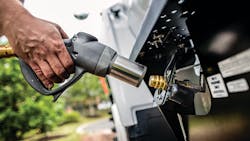Sticking to the routine of using traditional gasoline or diesel for your fleet may seem like a safe and reliable option, but there are better and more efficient alternatives available today. Propane autogas is one such alternative that provides benefits to the environment, your bottom line, and even your fleet’s lifespan.
The Propane Education & Research Council often gets questions from fleet managers ready to take the next step with an alternative fuel. In this article, we’ll provide you with all the information you need to know to transition your fleet to propane autogas.
Consider the benefits. While savvy fleet owners are aware of the environmental benefits of propane autogas in reducing emissions and improving air quality, some are surprised to learn that it also provides the lowest total cost-of-ownership. Fleet owners who transition to propane autogas can see up to a 50% reduction in fuel costs compared to gasoline or diesel. In addition, propane autogas engines are 90% cleaner than EPA standards and require less maintenance, resulting in lower long-term costs.
Explore your options. Gasoline-powered fleets can convert their existing vehicles to propane autogas with an EPA-certified aftermarket bi-fuel system. These systems operate on propane autogas as the primary fuel but also have a reserve tank of gasoline for added resiliency. While diesel vehicles cannot be converted using the aftermarket fuel system, they can be replaced with a new, comparably powered propane autogas vehicle.
Estimate conversion costs. Aftermarket conversion system installations typically range from six to ten labor hours and can be completed in one day if scheduled in advance. The cost for class 1-4 vehicles generally ranges from $6,000 to $9,000, including labor costs to install the conversion system.
Choose a refueling option. Fleets can choose from several refueling options, each of which offers distinct advantages:
- Standard private station: This option is best for fleets with fewer than 50 vehicles and includes a 1,000- to 3,000-gallon propane storage tank and one or more dispensers installed on-site in a convenient location for the fleet.
- Advanced private station: This option is best for fleets with 50 vehicles or more and requires a centralized refueling location. This station includes a large propane tank(s) and two or more fuel dispensers. Like all permanent propane autogas refueling solutions, the station can easily grow with the expansion of the fleet.
- Temporary refueling: Your local propane supplier should be able to provide a fuel storage tank and dispenser mounted on a trailer that can be delivered to designated locations or work sites. A propane bobtail truck will replenish the fuel supply on a specific delivery schedule. Costs and availability will vary with this option, so check with your propane supplier for details and pricing.
- Mobile refueling: Fleets can work with a propane supplier to customize an on-site refueling plan utilizing a propane bobtail delivery truck. Costs and situations will vary so check with your local supplier.
- Public refueling networks: There are more than 2,500 public refueling stations in most areas of the country that provide fuel for fleets as needed. Refueling networks provide 24/7 security and convenience and use a card lock system that tracks fuel usage and costs per vehicle. A complete list of public refueling stations is available from the U.S. Alternative Fuels Data Center on the Propane Education and Research Council website.
Plan for maintenance. Maintaining a propane autogas engine is generally more convenient than maintaining a diesel engine because it doesn’t require exhaust after-treatment systems. New propane engines are similar in operation to gasoline engines and require similar equipment for maintenance, diagnosis, and repair. There are opportunities for technicians to train and become certified to diagnose, maintain, and repair propane autogas fuel systems through OEMs, dealers, and aftermarket fuel system manufacturers.
Transitioning to propane autogas is a smart decision for fleet owners. It's a cleaner energy source that reduces emissions, saves costs, increases vehicle lifespan, and has various refueling options to suit different fleet sizes and needs. By exploring your options, estimating conversion costs, choosing a refueling option, and planning for maintenance, there’s no reason to put off transitioning to a propane autogas fleet any longer. To learn more about propane autogas vehicles, visit Propane.com/Fleet-Vehicles.
